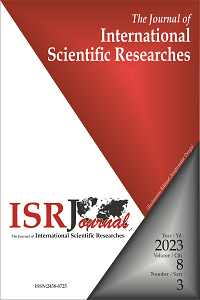Exploring The Relationship between Energy Sources, CO2 Emissions and Sustainable Development in Türkiye
Abstract
Sustainable development has become a major focus of attention worldwide, with numerous initiatives aimed at improving economic development, social equality, natural resource consumption, and social and healthy living while preserving the quality of life. Energy consumption is a crucial input to economic activities, but its impact on sustainable development can be both positive and negative. In this study, the impact of renewable and non-renewable energy sources and CO2 emissions on sustainable development in Turkiye was investigated using time series analysis for the years between 1972 and 2015. The results suggest that increasing the use of renewable energy sources has a positive effect on sustainable development, whereas fossil fuel energy consumption and CO2 emissions have a negative impact. The findings of this research have important implications for Turkiye's energy policy and its efforts to achieve sustainable development goals.
References
- Acaravcı, A., & Erdoğan, S. (2018). Yenilenebilir Enerji, Çevre ve Ekonomik Büyüme İlişkisi: Seçilmiş Ülkeler için Ampirik Bir Analiz. Journal, 13(1), 53–64.
- Ahmad, A., Zhao, Y., Shahbaz, M., Bano, S., Zhang, Z., Wang, S., & Liu, Y. (2016). Carbon emissions, energy consumption and economic growth: An aggregate and disaggregate analysis of the Indian economy. Energy Policy, 96, 131–143. https://doi.org/10.1016/j.enpol.2016.05.032
- Albayrak, E. N., & Gökçe, A. (2015). Ekonomik büyüme ve çevresel kirlilik ilişkisi: cevresel Kuznets eğrisi ve Türkiye örneğ. Sosyal Bilimler Araştrma Dergisi, 4(2), 279–301.
- Ali, A., Radulescu, M., & Balsalobre-lorente, D. (2023). A dynamic relationship between renewable energy consumption, nonrenewable energy consumption, economic growth, and carbon dioxide emissions: Evidence from Asian emerging economies. Energy & Environment.
- Altinoz, B., Apergis, N., & Aslan, A. (2020). Energy Consumption, Carbon Dioxide Emissions and Economic Growth: Fresh Evidence From Panel Quantile Regressions.
- Aye, G. C., & Edoja, P. E. (2017). Effect of economic growth on CO2 emission in developing countries: Evidence from a dynamic panel threshold model. Cogent Economics & Finance, 5.
- Çetin, M., & Sezen, S. (2018). Türkiye’de Yenilenebilir Ve Yenilenemeyen Enerji Tüketimi, Ekonomik Büyüme Ve Karbondioksit Salınımı Arasındaki İlişki: Bir SVAR (Yapısal Var) Analizi. Journal of Management and Economic Research, 16(1), 136–157.
- Chen, J.-H., & Huang, Y.-F. (2013). The Study of the Relationship between Carbon Dioxide (CO 2 ) Emission and Economic Growth.
- Coondoo, D., & Dinda, S. (2002). Causality between income and emission: a country group-specific econometric analysis. Ecological Economics, 40(3), 351–367. https://doi.org/10.1016/S0921-8009(01)00280-4
Abstract
References
- Acaravcı, A., & Erdoğan, S. (2018). Yenilenebilir Enerji, Çevre ve Ekonomik Büyüme İlişkisi: Seçilmiş Ülkeler için Ampirik Bir Analiz. Journal, 13(1), 53–64.
- Ahmad, A., Zhao, Y., Shahbaz, M., Bano, S., Zhang, Z., Wang, S., & Liu, Y. (2016). Carbon emissions, energy consumption and economic growth: An aggregate and disaggregate analysis of the Indian economy. Energy Policy, 96, 131–143. https://doi.org/10.1016/j.enpol.2016.05.032
- Albayrak, E. N., & Gökçe, A. (2015). Ekonomik büyüme ve çevresel kirlilik ilişkisi: cevresel Kuznets eğrisi ve Türkiye örneğ. Sosyal Bilimler Araştrma Dergisi, 4(2), 279–301.
- Ali, A., Radulescu, M., & Balsalobre-lorente, D. (2023). A dynamic relationship between renewable energy consumption, nonrenewable energy consumption, economic growth, and carbon dioxide emissions: Evidence from Asian emerging economies. Energy & Environment.
- Altinoz, B., Apergis, N., & Aslan, A. (2020). Energy Consumption, Carbon Dioxide Emissions and Economic Growth: Fresh Evidence From Panel Quantile Regressions.
- Aye, G. C., & Edoja, P. E. (2017). Effect of economic growth on CO2 emission in developing countries: Evidence from a dynamic panel threshold model. Cogent Economics & Finance, 5.
- Çetin, M., & Sezen, S. (2018). Türkiye’de Yenilenebilir Ve Yenilenemeyen Enerji Tüketimi, Ekonomik Büyüme Ve Karbondioksit Salınımı Arasındaki İlişki: Bir SVAR (Yapısal Var) Analizi. Journal of Management and Economic Research, 16(1), 136–157.
- Chen, J.-H., & Huang, Y.-F. (2013). The Study of the Relationship between Carbon Dioxide (CO 2 ) Emission and Economic Growth.
- Coondoo, D., & Dinda, S. (2002). Causality between income and emission: a country group-specific econometric analysis. Ecological Economics, 40(3), 351–367. https://doi.org/10.1016/S0921-8009(01)00280-4
Details
| Primary Language | English |
|---|---|
| Subjects | Development Economics - Macro, Environmental Economy |
| Journal Section | Articles |
| Authors | |
| Publication Date | October 27, 2023 |
| Submission Date | June 9, 2023 |
| Published in Issue | Year 2023 Volume: 8 Issue: 3 |


